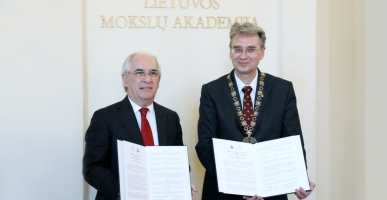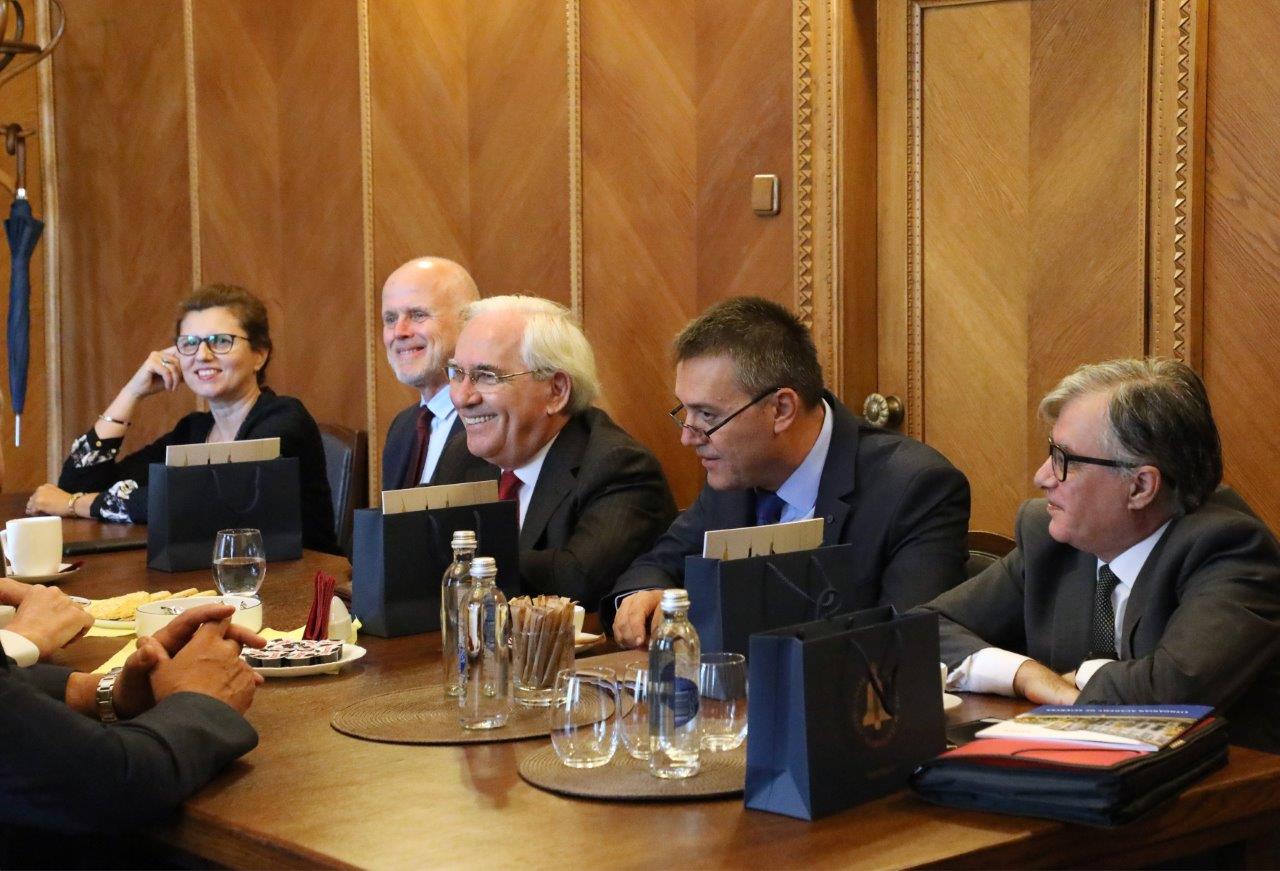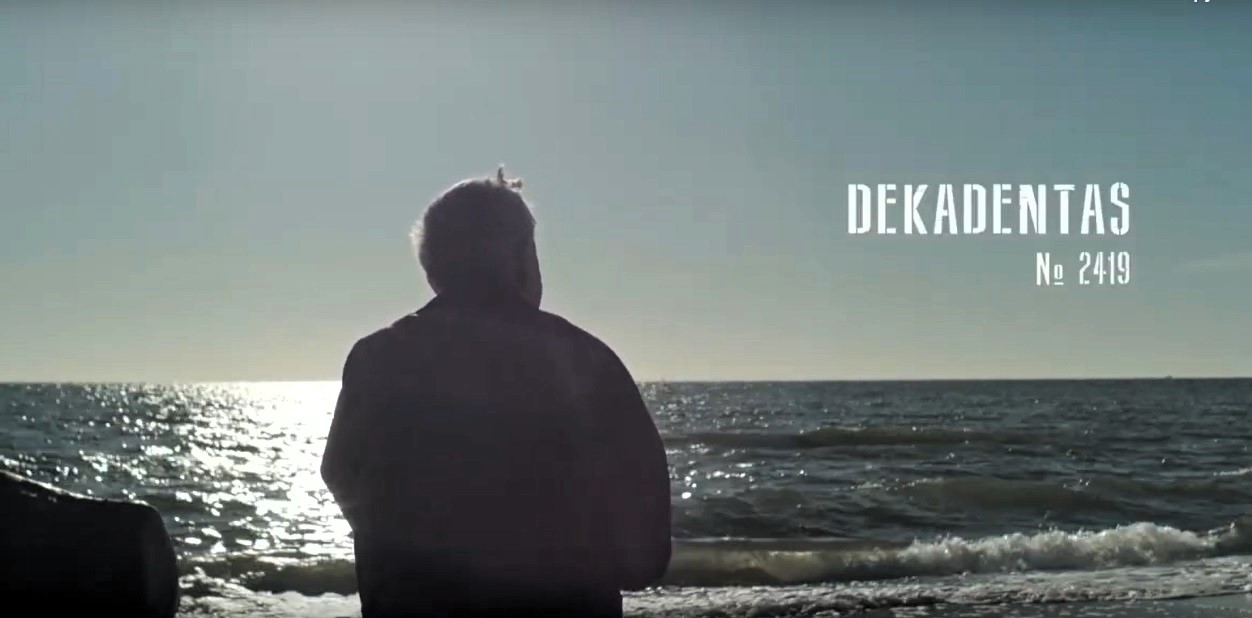Events
How an Ambition Turned into an Achievement
30 09 2023
In May 2023, Zenonas Dabkevičius, vice president of the Lithuanian Academy of Sciences, Vidmantas Stanys, chair of the Division of Agricultural and Forestry Sciences of the Academy, and Giedrė Samuolienė, chair of the section of agricultural sciences of this division, visited Albania where they met Skënder Gjinushi, president of the Albanian Academy of Sciences, Prof. Nazim Gruda, and other prominent members of the Albanian Academy of Sciences to discuss the signing of a cooperation agreement between the two academies.
This idea materialised on 26 September 2023, when the president of the Albanian Academy of Sciences and his colleagues visited the Lithuanian Academy of Sciences.
Before signing the agreement, President Jūras Banys briefly explained the structure of the Lithuanian Academy of Sciences, talked about its expert activities, the international conferences the Academy had organised, and relations with international organisations. He also mentioned the Academy's assistance to the National Academy of Sciences of Ukraine. The structure and activities of the Academy's divisions were presented by Romas Baronas, a member of the Division of Technical Sciences, Vidmantas Stanys, chair of the Division of Agricultural and Forestry Sciences, Leonas Valkūnas, chair of Mathematical, Physical, and Chemical Sciences, Limas Kupčinskas, chair of the Biological, Medical, and Geosciences, Vytautas Nekrošius, chair of the Humanities and Social Sciences, and Viktorija Vaštakaitė-Kairienė, vice chair of the Young Academy of the Lithuanian Academy of Sciences.

Delegation of the Albanian Academy of Sciences at the Lithuanian Academy of Sciences. Left to right: Anila Hoda, Nazim Gruda, Skënder Gjinushi, Dorian Koçi, Shaban Sinani.
Skënder Gjinushi, president of the Albanian Academy of Sciences, thanked for the invitation to visit Lithuania and described the structure and activities of the Albanian academy. It was founded in 1972. In the 1980s, a number of research institutes that had been set up at the University of Tirana were brought under the jurisdiction of the Academy. During its reform, the Albanian Academy of Sciences followed the examples of other European academies, including the Lithuanian Academy of Sciences. At present, the Albanian Academy of Sciences has 33 permanent members, 20 emeriti members, ten foreign members, and seven honorary members The Albanian academy has two divisions: the Section of Social Sciences and Alban Studies and the Section of Natural and Technical Sciences. One of the aims of this institution is to achieve the allocation of 1% of gross domestic product from the national budget to scientific research.
Skënder Gjinushi’s presentation was continued by Prof. Nazim Gruda, who recalled the beginnings of cooperation between Albanian and Lithuanian scientists in the development of innovations for sustainable agriculture, which explains the importance of cooperation with Vidmantas Stanys and his colleagues in the field of plant breeding. The aim is to improve plant properties and develop new varieties using advanced genetic techniques. Shaban Sinani, secretary general of the Albanian Academy of Sciences, spoke about the activities of the Albanian academy in coordinating humanities projects in the fields of linguistics and mythology. He also pointed out that various works by Lithuanian authors have been translated and published in Albania.
The cooperation agreement signed by the presidents of the two academies after this presentation will further strengthen the scientific ties between the countries.
The guests also recalled the cultural links between Lithuania and Albania and presented the heads of the Lithuanian Academy of Sciences with DVDs featuring the work of the Albanian director Saimir Bajo: the documentary Decadent No. 2419. This film is a portrait of Tomas Venclova, a poet, essayist, translator, dissident, and a Yale University professor of literature, which combines stories about the creator, the time of political controversy, the cultural experience of captivity, a gallery of exceptional personalities, the search for historical truth, and the language of poetry that became a true home for four decades in the protagonist's journey from exile to Lithuania. The film was released in Lithuanian cinemas in the autumn of 2022 and nominated for this year’s ‘Silver Crane’ Awards.

Prepared by Dr Rolandas Maskoliūnas, Chief Specialist for Public Relations
Translated by Diana Barnard
Photos by Virginija Valuckienė
